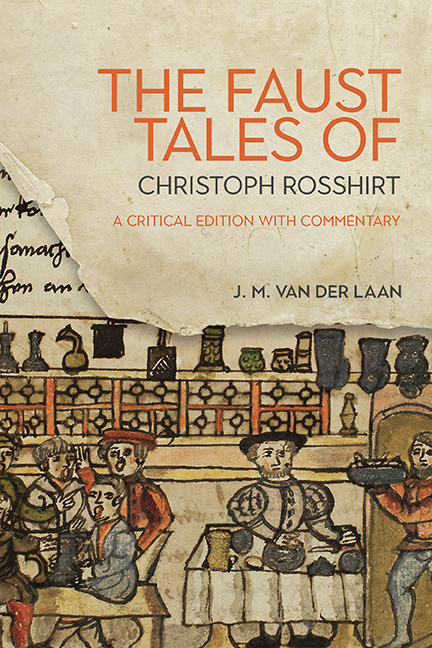Book contents
- Frontmatter
- Dedication
- Contents
- List of Illustrations
- Acknowledgments
- Introduction: Faust, Christoph Rosshirt, and His Manuscript
- Part I Christoph Rosshirt's Faust Tales
- Part II Commentary
- Faust Illustrated from Rosshirt to Delacroix and Beyond
- Faust's Identity and the Significance of Rosshirt's Tales about Him
- Bibliography
- Index
Faust's Identity and the Significance of Rosshirt's Tales about Him
from Part II - Commentary
Published online by Cambridge University Press: 03 September 2019
- Frontmatter
- Dedication
- Contents
- List of Illustrations
- Acknowledgments
- Introduction: Faust, Christoph Rosshirt, and His Manuscript
- Part I Christoph Rosshirt's Faust Tales
- Part II Commentary
- Faust Illustrated from Rosshirt to Delacroix and Beyond
- Faust's Identity and the Significance of Rosshirt's Tales about Him
- Bibliography
- Index
Summary
Who Is Faust?
THAT SOMEONE NAMED Faustus (either Georgius, or Johannes, or Johannes Georgius, or even Heinrich, as Goethe later called him) had to have been a historical human being from an actual time and place has mattered much to many scholars over many years. Among them are Frank Baron, Horst Hartmann, Hans Henning, and Günther Mahal. For them, a real, live, flesh-and-blood Faustus (either from Knittlingen or Helmstett/Helmstadt) had to have existed as a matter of fact. Of course, even our all-important “facts” are, as the Latin roots factum and facere remind us, not something given, a datum, but something we ourselves have done or made. But did Faustus actually exist, and does it really matter? Actual evidence is not only sparse but spurious. And what matters is not the positive identification of a historical person named Faustus but that the one so named, even in the sixteenth century, really only lives in works of the imagination.
Let me state at the outset that I have no particular antagonism toward those scholars I mentioned, not with Mahal nor with Baron nor with anyone else. Rather, I challenge the quest for a historical Faust, the mistaken notion that such a person had to have existed, the persistence and perpetuation of such a notion, and a determination to discover and pin him down once and for all. For example, based on Baron's work, the Marlowe scholar Michael Keefer has accepted that “there is in fact good evidence that the notorious Dr. Faustus, whose Christian name was Georg or Georgius, was born in one or another of the two villages of Helmstadt in the vicinity of Heidelberg and Würzburg” (73). Note that even Keefer offers the vicinity of Würzburg, quite a distance from Heidelberg, as an additional option for a possible place of birth. Like Keefer, John Henry Jones writes in his critical edition of the English Faust book that “Baron's identification of the historical Faust with Georg Helmstetter” is “probably correct,” albeit “insecure” (73n7). The “Faust” entry in the 2005 Deutsche biographische Enzyklopädie der Theologie und der Kirchen (German Encyclopedia of Theology and Churches) lists approximate dates of birth (1480) and death (1540/41) for Faust and maintains that a person by that name was “the historical model for the Faust legend and literature” (“das historische Vorbild für die Faust-Sage und -Dichtung,” 406).
- Type
- Chapter
- Information
- The Faust Tales of Christoph RosshirtA Critical Edition with Commentary, pp. 207 - 238Publisher: Boydell & BrewerPrint publication year: 2019



